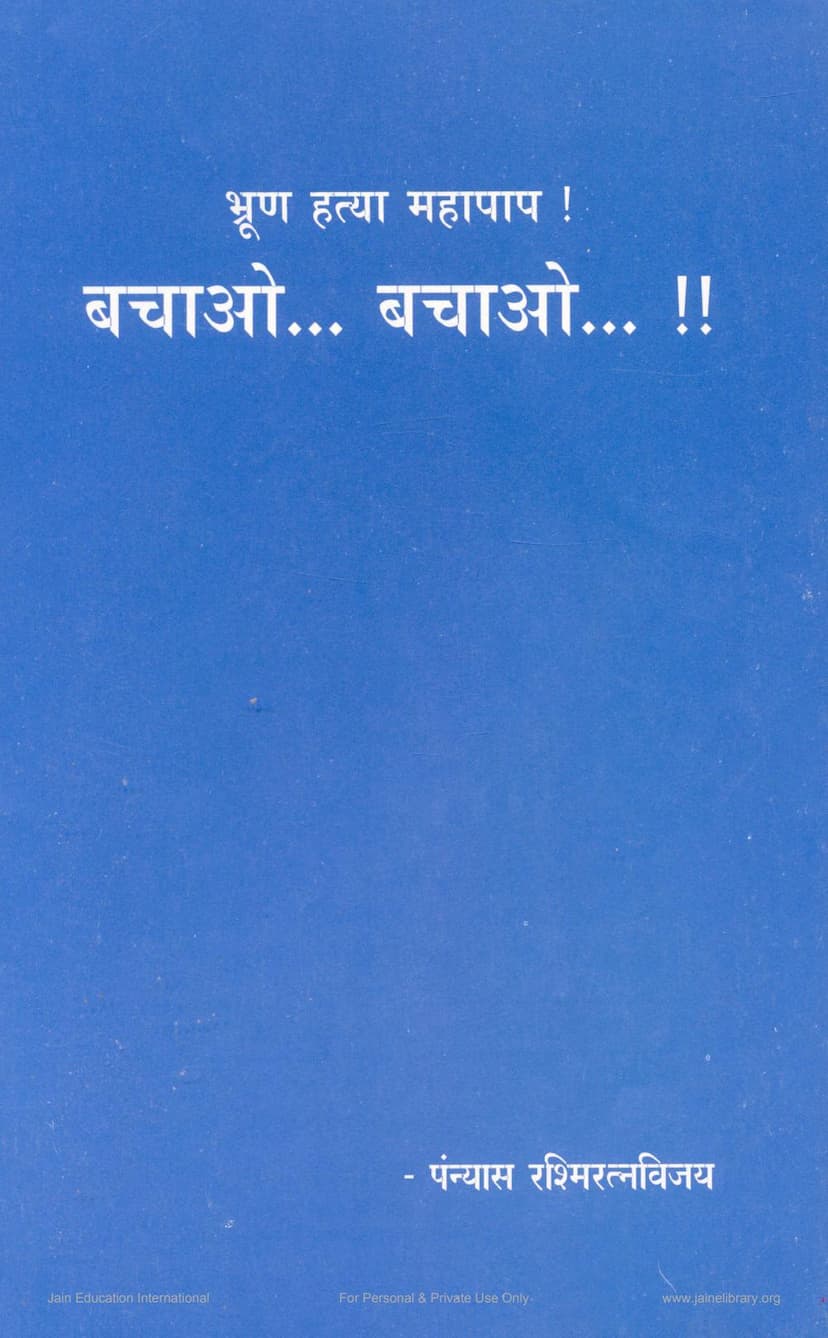Bhrun Hatya Maha Paap Bachao Bachao
Added to library: September 1, 2025

Summary
Here's a comprehensive summary of the Jain text "Bhrun Hatya Maha Paap Bachao Bachao" (Fetal Killing: The Great Sin, Save! Save!) by Rashmiratnasuri:
Overall Theme: The book is a powerful and impassioned plea against the grave sin of abortion (fetal killing) from a Jain perspective, emphasizing its religious, moral, and societal implications. It aims to awaken the conscience of readers, particularly women and parents, to the horrific nature of abortion and its devastating consequences.
Key Arguments and Points:
- Abortion as a "Great Sin" (Maha Paap): The central message is that abortion is not merely a medical procedure but a terrible sin that violates the fundamental Jain principle of ahimsa (non-violence) at its deepest level, as it involves the deliberate killing of a nascent life.
- The "White Revolution" (Shwet Kranti): The book calls for a "white revolution" against abortion, urging people to embrace this cause and take action. It suggests that the "V for Victory" is in the hands of the readers.
- The Cry of the Unborn Child: The text vividly portrays the agony and suffering of the unborn child, presenting its screams as a cry of pain and a plea for life. It uses evocative language like "Oh Maa! I am dead...!" to convey this anguish.
- Devaluation of Indian Culture and Morality: The book argues that modern Western influences, beauty contests, cinema, and a focus on vanity are leading women astray, causing them to abandon traditional Indian values, modesty, and cultural heritage. This deviation is seen as a "violation of sanctity" (Maryada Hnan).
- The "Chir-haran" (Draping/Disrobing) of Culture: The author uses the metaphor of Draupadi's disrobing (Chir-haran) in the Mahabharata to illustrate how modern women, by embracing Westernized lifestyles and participating in acts like abortion, are disrespecting and destroying the sanctity of Indian culture.
- Consequences of Abortion: The text outlines severe consequences for individuals and society:
- Spiritual Consequences: Abortion is described as a "passport to hell" (Narakgati ka passport), leading to severe karmic retribution and rebirths in unfortunate states.
- Personal Suffering: Women who undergo abortions are said to suffer lifelong illnesses, domestic strife, and a hardened heart, losing their maternal instincts.
- Societal Decay: The increasing prevalence of abortion is linked to the breakdown of societal values, the erosion of family structures, and a general decline in morality and spirituality.
- Critique of Modern Trends: The book criticizes various aspects of modern society, including:
- Westernization: The pursuit of beauty queens, actresses, and immodest fashion is seen as a sign of cultural decline.
- Media Influence: The portrayal of negative influences on television and in movies is highlighted as contributing to moral decay.
- Consumerism and Materialism: The focus on personal pleasure, wealth, and superficial beauty is blamed for the loss of spiritual values.
- The Role of Doctors and Medical Practices: The book sternly criticizes doctors and medical practitioners who perform abortions, calling their actions "murder centers" and accusing them of violating their oaths to preserve life. It details various crude and painful abortion methods.
- Sonography as a Tool for Female Feticide: A significant portion of the book is dedicated to criticizing the misuse of sonography, which allows parents to determine the sex of the fetus and leads to the termination of female fetuses. This is highlighted as a particularly heinous form of feticide.
- The Jain Perspective on Life: The text emphasizes the Jain belief in the sanctity of all life, from single-celled organisms to human beings. It reiterates the teachings of Lord Mahavir and Lord Buddha on non-violence and compassion.
- Call to Action: The book urges readers to:
- Spread Awareness: Share the message of the book with others.
- Make a Resolution: Pledge to never participate in or encourage abortion.
- Uphold Values: Recommit to traditional Indian and Jain values.
- Challenge Harmful Practices: Advocate for the banning of practices like sex-selective abortion and the promotion of family planning methods that do not involve abortion.
- Rejection of False Beliefs: Counter the propaganda that abortion is a simple or harmless procedure.
- Critique of Government Policies: The latter part of the book, presented as an appeal to the President and other leaders, criticizes several government policies that are seen as detrimental to Jain and Indian culture. These include:
- Meat export
- Sex education in schools (seen as promoting promiscuity)
- Including non-vegetarian food in school midday meals
- Restrictions on charitable trusts
- Labeling Santhara (Jain ritual of voluntary fasting to the death) as suicide
- Laws that are perceived as infringing on religious freedom
- Promotion of meat technology courses
- Broadcasting adult films
- Licensing the killing of blue bulls (Nilgai)
- Turning holy pilgrimage sites into tourist spots
- And, of course, the continued allowance of abortion.
Target Audience: Primarily mothers, sisters, guardians, and all who are concerned about the moral and spiritual health of society.
Overall Tone: The book is written with a sense of urgency, alarm, and deep moral conviction. It uses strong language and emotional appeals to shock the reader into recognizing the severity of the issue of abortion. It is a fervent call to preserve life and uphold the sanctity of Indian culture and Jain principles.